Related Research Articles

The Battle of Adwa was the climactic battle of the First Italo-Ethiopian War. The Ethiopian forces defeated the Italian invading force on Sunday 1 March 1896, near the town of Adwa. The decisive victory thwarted the campaign of the Kingdom of Italy to expand its colonial empire in the Horn of Africa. By the end of the 19th century, European powers had carved up almost all of Africa after the Berlin Conference; only Ethiopia and Liberia still maintained their independence. Adwa became a pre-eminent symbol of pan-Africanism and secured Ethiopian sovereignty until the Second Italo-Ethiopian War forty years later.

Haile Selassie I was Emperor of Ethiopia from 1930 to 1974. He rose to power as Regent Plenipotentiary of Ethiopia (Enderase) for Empress Zewditu from 1916 until 1930. Haile Selassie is widely considered a defining figure in modern Ethiopian history, and the key figure of Rastafari, a religious movement in Jamaica that emerged shortly after he became emperor in the 1930s. Before he rose to power he defeated Ras Gugsa Wole Bitul of Begemidr at the Battle of Anchem in 1928. He was a member of the Solomonic dynasty, which claims to trace lineage to Emperor Menelik I, believed to be the son of King Solomon and Makeda, the Queen of Sheba.

Marcus Mosiah Garvey Jr. was a Jamaican political activist. He was the founder and first President-General of the Universal Negro Improvement Association and African Communities League, through which he declared himself Provisional President of Africa. Ideologically a black nationalist and Pan-Africanist, his ideas came to be known as Garveyism.

Menelik II, baptised as Sahle Maryam was King of Shewa from 1866 to 1889 and Emperor of Ethiopia from 1889 to his death in 1913. At the height of his internal power and external prestige, the process of territorial expansion and creation of the modern empire-state was completed by 1898.
Samuel L. Manning was a Trinidadian performer and songwriter who was one of the earliest calypsonians to achieve international acclaim.
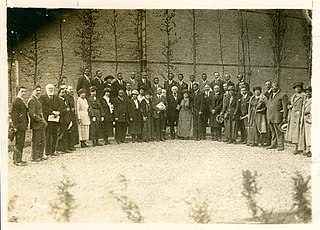
The Pan-African Congress (PAC) was a series of eight meetings which took place on the back of the Pan-African Conference held in London in 1900. The Pan-African Congress gained a reputation as a peacemaker for decolonization in Africa and in the West Indies. It made a significant advance for the Pan-African cause. One of the group's major demands was to end colonial rule and racial discrimination. It stood against imperialism and it demanded human rights and equality of economic opportunity. The manifesto given by the Pan-African Congress included the political and economic demands of the Congress for a new world context of international cooperation and the need to address the issues facing Africa as a result of European colonization of most of the continent.

RasMakonnen Wolde Mikael Wolde Melekot, or simply Ras Makonnen, also known as Abba Qagnew, was an Ethiopian royal from Shewa, a military leader, the governor of Harar, and the father of future Emperor Haile Selassie. Described by Nikolai Gumilev as “one of the greatest leaders of Abyssinia”, he served in the First Italo-Ethiopian War, playing a key role at the Battle of Adwa.
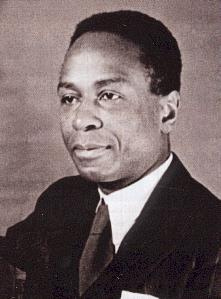
George Padmore, born Malcolm Ivan Meredith Nurse, was a leading Pan-Africanist, journalist, and author. He left his native Trinidad in 1924 to study medicine in the United States, where he also joined the Communist Party.
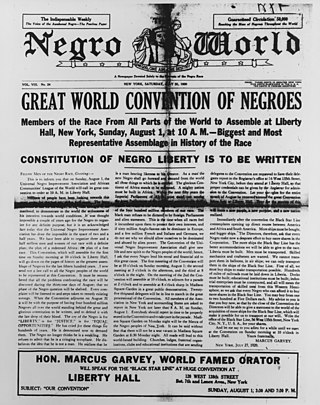
Negro World was the newspaper of the Marcus Garvey's Universal Negro Improvement Association and African Communities League (UNIA). Founded by Garvey and Amy Ashwood Garvey, the newspaper was published weekly in Harlem, and distributed internationally to the UNIA's chapters in more than forty countries. Distributed weekly, at its peak, the Negro World reached a circulation of 200,000.
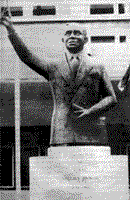
Isaac Theophilus Akunna Wallace-Johnson was a Sierra Leonean, British West African workers' leader, journalist, activist and politician.
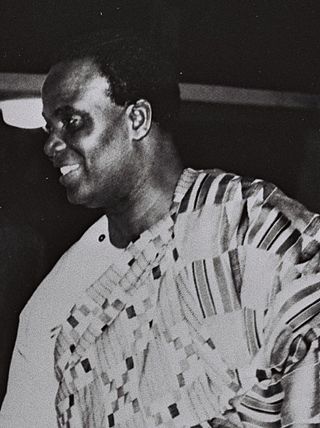
Kojo Botsio was a Ghanaian diplomat and politician. He studied in Britain, where he became the treasurer of the West African National Secretariat and an acting warden for the West African Students' Union. He served as his country's first Minister of Education and Social Welfare from 1951, as Minister for Foreign Affairs twice in the government of Kwame Nkrumah, and was a leading figure in the ruling Convention People's Party (CPP).
Amy Ashwood Garvey was a Jamaican Pan-Africanist activist. She was a director of the Black Star Line Steamship Corporation, and along with her former husband Marcus Garvey she founded the Negro World newspaper.
The International African Service Bureau (IASB) was a pan-African organisation founded in London in 1937 by West Indians George Padmore, C. L. R. James, Amy Ashwood Garvey, T. Ras Makonnen and Kenyan nationalist Jomo Kenyatta and Sierra Leonean labour activist and agitator I. T. A. Wallace-Johnson. Chris Braithwaite, was Secretary of this organisation.

The Italo-Ethiopian Treaty of 1928, also known as the Italo–Ethiopian Treaty of Friendship and Arbitration, was a treaty signed between the Kingdom of Italy and the Ethiopian Empire on 2 August 1928. Nigiste Negest Zewditu I ruled Ethiopia at the time of this treaty, but it was the 36-year-old Ras Tafari Makonnen who represented the government of Ethiopia. Tafari, who was still in his minority, was heir apparent and Regent Plenipotentiary.
Hailu Tekle Haymanot, also named Hailu II of Gojjam, was an army commander and a member of the nobility of the Ethiopian Empire. He represented a provincial ruling elite who were often at odds with the Ethiopian central government. Hailu Tekle Haymanot was an independent-minded potentate who, throughout his life, was mistrustful of and mistrusted by the Emperor.
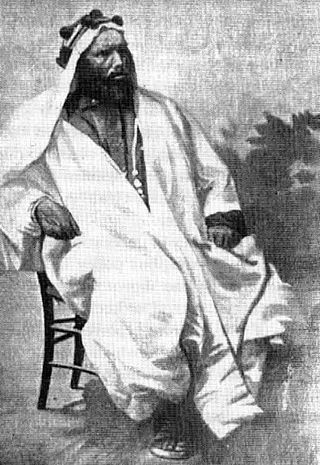
Ras Alula Engida was an Ethiopian general and politician who successfully led battles against Ottoman Egypt, the Mahdists and Italy. He was one of the most important leaders of the Abyssinian forces during the 19th century. Described by Haggai Erlich as the "greatest leader whom Ethiopia produced since the death of Emperor Tewodros II in 1868." Ras Alula was referred to by Europeans as "the Garibaldi of Ethiopia".
T. Ras Makonnen was a Guyanese-born Pan-African activist of Ethiopian descent.
Chris Braithwaite, also known as Chris Jones, was a black Barbadian who was leader of the Colonial Seamen's Association in the 1930s.

Cyril Lionel Robert James, who sometimes wrote under the pen-name J. R. Johnson, was a Trinidadian historian, journalist, Trotskyist activist and Marxist writer. His works are influential in various theoretical, social, and historiographical contexts. His work is a staple of Marxism, and he figures as a pioneering and influential voice in postcolonial literature. A tireless political activist, James is the author of the 1937 work World Revolution outlining the history of the Communist International, which stirred debate in Trotskyist circles, and in 1938 he wrote on the Haitian Revolution, The Black Jacobins.

50 Carnaby Street in London's Soho district was the site of several important music clubs in the 20th century. These clubs were often run for and by the black community, with jazz and calypso music predominating in the earlier years. From 1936, it was the Florence Mills Social Parlour. In the 1940s it was the Blue Lagoon Club. In 1950, it was briefly Club Eleven, and from the early 1950s it was the Sunset Club. From 1961, it was occupied by the Roaring Twenties nightclub. In the 1970s it was Columbo's. It is now a Ben Sherman shop.
References
- 1 2 3 Daniel James Whittall, "Creolising London: Black West Indian activism and the politics of race and empire in Britain, 1931–1948". Thesis, Royal Holloway, University of London, p. 225.
- 1 2 The Manchester Guardian , 29 July 1935.
- ↑ The Times, 29 July 1935.
- ↑ "A London diary" and "Africans and Abyssinia: Meeting of London sympathisers", West Africa , 3 August 1935.
- ↑ The Manchester Guardian. 26 August 1935.
- ↑ Hogsbjerg, Christian (2014). C. L. R. James in Imperial Britain. London. p. 91.
{{cite book}}: CS1 maint: location missing publisher (link)